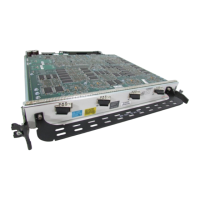Implementing Multicast Routing on Cisco IOS XR Software Cisco ASR 9000 Series Routers
Multicast only fast reroute (MoFRR)
MCC-63
Multicast Configuration Guide
OL-
Multicast only fast reroute (MoFRR)
Feature Overview
MoFRR allows fast reroute for multicast traffic on a multicast router. MoFRR minimizes packet loss in
a network when node or link failures occur(at the topology merge point). It works by making simple
enhancements to multicast routing protocols.
MoFRR involves transmitting a multicast join message from a receiver towards a source on a primary
path and transmitting a secondary multicast join message from the receiver towards the source on a
backup path. Data packets are received from the primary and secondary paths. The redundant packets
are discarded at topology merge points with the help of Reverse Path Forwarding (RPF) checks. When
a failure is detected on the primary path, the repair occurs locally by changing the interface on which
packets are accepted to the secondary interface, thus improving the convergence times in the event of a
node or link failure on the primary path.
Currently MoFRR is supported on Equal Cost MultiPath (ECMP) topologies only. XML support is
available for MoFRR.
Operating Modes of MoFRR
• RIB-based MoFRR—Supports Cisco CRS-1 and XR12000 series routers; the RIB version is
configured at the software level and is based on routing convergence. RIB events are used as trigger
for switchover.
• Flow-based MoFRR—Supports the Cisco ASR 9000 Series Aggregation Services Router.
Flow-based exposes the primary and secondary RPF interfaces to the forwarding plane, with
switchover occurring entirely at the hardware level.
Faster convergence is obtainable in Flow-based MoFRR by monitoring the packet counts of the primary
stream. If no activity is detected for 30 ms, the switch over is triggered to the backup stream and the
traffic loss is within 50 ms.
Configuring MoFRR
RIB-based MoFRR
SUMMARY STEPS
1. configure
2. router pim
3. mofrr rib acl-name
4. end or commit

